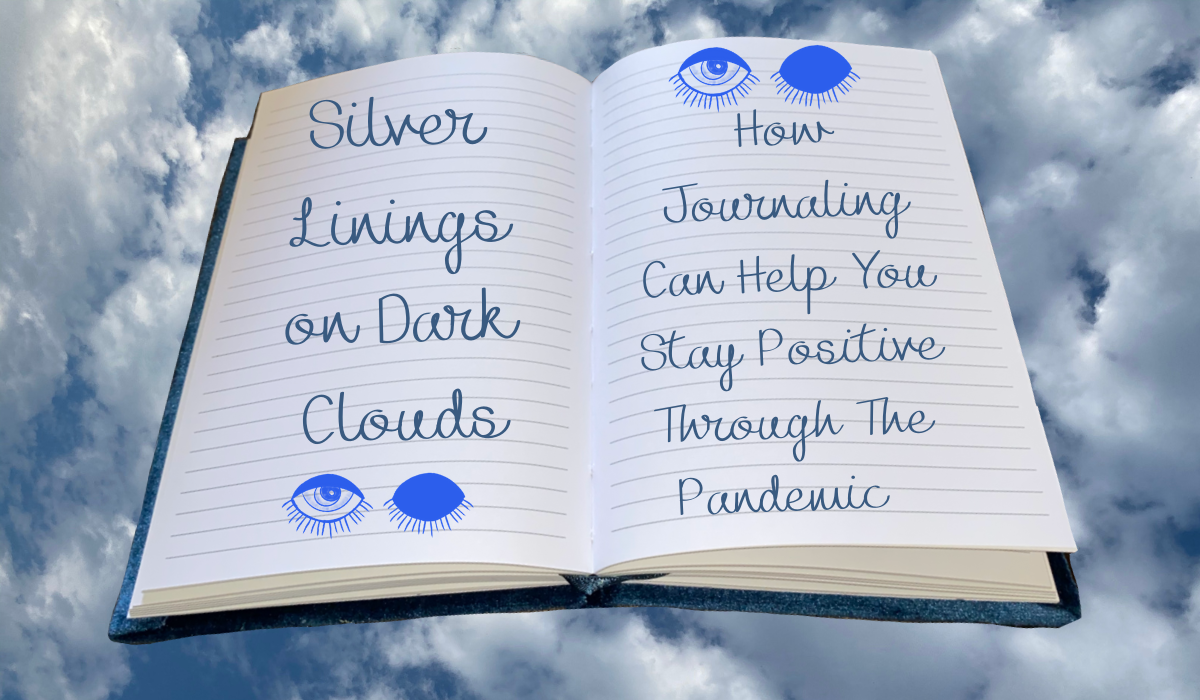Silver Linings on Dark Clouds: How Journaling Can Help You Stay Positive Through The Pandemic

It would be the understatement of the century to say that the last year has been different. In almost every imaginable way, life has changed for everyone. The year of the pandemic brought with it a palpable shift in the way we live our lives. The way we work, study, eat, drink and think has been altered, and we did not know for how long. In the midst of the more tangible changes we have all faced has been an undercurrent of change in our mindsets as well. In March of 2020 we all bode farewell to our social lives, work routines and educational structure. The effect of this on our mental health and wellbeing cannot be understated. For many of us being confined to our homes for months on end with no foreseeable and definite end to the situation was a suffocating reality. Even for those with happy, healthy and safe homes, the reality of life in lockdown was not simply one of binge watching, face masks and learning how to cook through Youtube videos. Being isolated from our friends and wider network of family can lead to feeling as though every day is the same, just an endless cycle of trying to get through our tasks for the day with no real awareness of what we gained and accomplished. This was certainly the case for me, and is exactly where journaling served as an effective tool to help me change my perspectives and realise all that I have to be thankful for.
Initially, each day melted into the next, soon I had no idea what day of the week it was and somehow March melted into October without me really comprehending the importance of each day. It is easy to tell ourselves that every day that we are lucky enough to be healthy and alive on this planet should be appreciated, and we should be thankful for each day that passes. This was difficult to do when everyday was the same and the whole planet seemed to be in some sort of perverse Groundhog Day situation.
It was sometime in October when I realised that there was no point trying to simply survive this pandemic; I was determined to live through it. This is when I decided to start journaling every night (and maybe you should try it too). Before settling on journaling as my method of mental relaxation, I considered meditation as a more “traditional” method of practicing mindfulness. However meditation is not for everyone, and while those who are able to do it swear by it, for me it was a tedious task and one which I could not keep up with. I found that it made me restless, and this was the opposite of what I was trying to achieve. What I needed was a more efficient way to collect my positive thoughts and manifest an open mindset. So I decided to try journaling my way to mindfulness, and have been very impressed with the results.
As we are settling into our third lockdown here in Kathmandu, I have seen and have been feeling so much frustration at the situation we are in. It seems as if every time we think we are finally coming out of the Covid-19 nightmare we slip right back into it, with each wave bringing more panic and tragedy. While it may seem that journaling is hardly something that should be prioritised in the current climate when we all have loved ones and livelihoods to worry about, I would encourage everyone to make your own wellbeing a priority. We cannot hope to be the best support possible for those around us if we ourselves are not functioning at our best. Investing in our own mental health will never go amiss, it is just about finding the right tools that work for each of us.
I was never going to be the type of person who wrote page upon page on how my day went or how I was feeling. This meant my journaling had to be quick, easy and effective. To achieve this, I decided that every night I would answer two statements: “Today I am grateful for” and “The high point of my day was.” Answering these questions takes me no more than five minutes every day. I started off with writing these down on my iPad and tried this for about a week. However something about this didn’t feel right, and often I would close my notes app and venture onto Youtube, Netflix or even worse: THE NEWS, and by the time I went to sleep I would have forgotten what I was grateful for and what the high point of my day even was. So I decided I would have to go old school with this. I pulled out a notebook, and told myself that journaling would be the very last thing I did before I went to sleep. Once I have put away my phone and other distractions for the night, I reach for my notebook and scribble down my answers to the questions above. This means that I fall asleep thinking positive thoughts, rather than dwelling on all the negativity around us at the moment. This habit has made me realise that happiness is around us, we just have to take a moment to look for it. Each day (even the bad ones) have something positive to offer even if it is simply that you made the perfect cup of tea. Going to sleep thinking about that perfect cup of tea is much more pleasant than thinking about any number of other things that you may have otherwise spent your last moments of the day obsessing over.
Of course, if you do give this a try there is no reason for you to stick to writing about the same things that I did. You may find it helpful to answer different questions, to recount your day or even to write letters to yourself. The point is that you write down something positive each day. There will always be the temptation to rant and get the things weighing you down off your chest, and that might be helpful for some, but for me journalling is about dwelling on the ups rather than complaining about the downs. The questions I choose to answer keep me focused on what is good and helps me to end my day on an emotional high. So, if you do choose to go down the route of using journaling as a means to process all your complex emotions, perhaps try to at least end the entry on an uplifting note, as the point of the exercise is to help you see the silver lining rather than just the dark cloud.
As I continued this habit over the following months, I noticed that often the things I am grateful for were the same day to day. At first this repetition bothered me, but over time I came to realise that I don’t need an infinite and ever-changing list of things to be thankful about, but rather to be happy that I even have these things in my life. Whether it was my friends, family, relationships or pets, just writing down over and over again how much these things mean to me helped me to see how lucky I am. Repetition is a very effective way of affirming and manifesting what we are thankful for in our lives. Keep reminding yourself of the things that bring you joy, the moments that made you laugh and the people who make your life special. When you look back and see the words you wrote about yourself, to yourself, you will come to realise that there is value in your own voice. The facts of our lives may be out of our control, particularly now, but the way we look at these facts can determine how we remember them and writing down even one thing that made you feel good everyday is certainly better than nothing at all.

